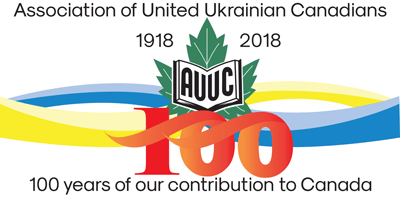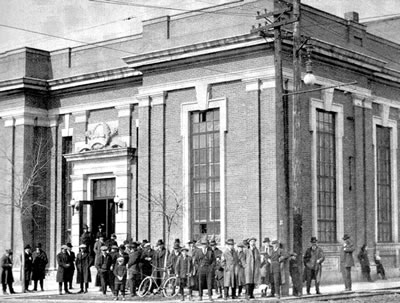The Association of United Ukrainian Canadians is a progressive Organization with strong and durable roots in the people and history of Canada. The Association and its community, from the turn of the century, constitute the progressive wing of the Ukrainian ethnic group in the population.

The Association of United Ukrainian Canadians has evolved through a number of organizational stages due to conditions and climate of the time. It came on the scene as the Ukrainian Labour Temple Association (1918 - 1924), followed by the Ukrainian Labour-Farmer Temple Association (1925 - 1946), the Ukrainian Association to Aid the Fatherland (1941 - 1946); and finally, the Association of United Ukrainian Canadians (1946).
The Association of United Ukrainian Canadians is a progressive Organization with strong and durable roots in the people and history of Canada. The Association and its community, from the turn of the century, constitute the progressive wing of the Ukrainian ethnic group in the population. They are the offspring and heir to those beginnings that grew out of the early formative years of community development and the struggle to survive.
What began as an organization and community of immigrant labour, typical of its time, is an Association today with a broad popular base and contemporary democratic goals in a changing social culture and lifestyle. The Association and its predecessors have always been committed to change and progress in the interests of the people. This commitment remains as a trust and a duty.
.

1907 - The first Ukrainian language newspaper in Canada, Chervony Prapor (Red Banner) was published. Viewpoints expressed set the stage for humanistic thought in Ukrainian Canadian circles.
1918 - The Ukrainian Labour Temple Association, predecessor to the Association of United Ukrainian Canadians, is founded in Winnipeg on March 1, 1918. On that date, a joint meeting of the Ukrainian Social Democratic Party, the Volodymyr Vinnichenko Drama Circle and readers of the newspaper Rabochy Narod (Working People), decided to build Canada's First Ukrainian Labour Temple. On May 24, 1918, volunteers arrive with shovels and picks and begin digging the basement of their new hall, triumphantly completing it in February, 1919. This Ukrainian Labour Temple was recently designated as a historic resource of Manitoba.
1920 - At its first annual meeting, in January 1920, the ULTA has representation from 12 localities from Calgary to Montreal, effectively making this the first national convention of the organization.
1922 - The ULTA (forerunner of the AUUC) implements its far-reaching social program and organizes the Workers' Benevolent Association of Canada, to help those in need.
1924 - The ULTA is renamed Ukrainian Labour-Farmer Temple Association which is incorporated as a dominion-wide organization with 73 branches in 30 communities across Canada. Many string orchestras, brass bands and folk choirs, flourish and tour extensively throughout the towns and communities of Canada.
1928 - The ULFTA organizes Workers' and Farmers' Cooperatives in Ukrainian towns and cities.
1929 - By its tenth convention in February, the ULFTA grows to 187 branches, including women's and youth branches, two newspapers and two magazines, 63 libraries, a network of children's schools, and adult education classes. In this year, the Student Institute of the ULFTA (Ukrainian Labour-Farmer Temple Association) is established in Edmonton, with facilities for 50 students from across Canada.
1939 - The cultural high point in this decade for the ULFTA and a vivid demonstration of its strength is the First National Festival of Ukrainian Song, Music and Dance, staged in Toronto. Numerous spectacular national festivals followed to the present.
1940 - 1945 - The tremendous contribution of approximately $700,000 (a significant sum of money in these years) is collected by our members for Victory Bonds, the war effort and war orphans of Ukraine. Over 40,000 Canadians of Ukrainian descent serve the Allied cause.
1940 - The new name of the Association of United Ukrainian Canadians is adopted for our not-for-profit organization.
1946 - The Second Canadian Ukrainian National Music Festival is held in Edmonton, in July, before a collective audience of 15,000, involving 1,000 performers, including performing guests from Ukraine.
1950 -The AUUC is one of the founding groups of the Canadian Peace Congress and emerges during the decade as one of the strongest and most consistent supporters of the peace movement. Three students are sent to Ukraine to study Ukrainian song, music, dance and language
1951 - The Ukrainian Canadian Jubilee Festival is held in Maple Leaf Gardens in Toronto, on June 30th commemorating the 60th anniversary of Ukrainian immigration to Canada. It was attended by 10,000 viewers. The following day, in the presence of an estimated 45,000 people, a monument to Ukraine's bard, Taras Shevchenko, is unveiled at the AUUC Summer Children's Camp in Palermo (now part of Oakville, Ontario). This was the first such monument to Taras Shevchenko, on the North American continent.
1952 - The Taras Shevchenko Museum near Palermo, Ontario, opens.
1956 - A festival is held in Winnipeg. A monument is unveiled and a museum is opened, dedicated to the 100th birth anniversary of Ukrainian writer Ivan Franko.
1961 - A National Shevchenko Festival is held in Toronto. Approximately 300 people participate in the first tour to Ukraine, jointly organized by the AUUC and our sister organization, the Workers' Benevolent Association, on the occasion of 150 years since the birth of Taras Shevchenko. 20 National Ukrainian Centennial Celebration 2005.
1967 - Ten AUUC cultural groups from across Canada perform at Expo '67, in Montreal.
1970 - The Shevchenko Ensemble, consisting of the Shevchenko Male Chorus (formed by the West Toronto branch of the AUUC), the Toronto Mandolin Orchestra and dancers, is the first Ukrainian Canadian musical group to tour Ukraine.
1986 - Combined cultural, forces of the AUUC from across Canada perform in various cities in Ukraine as part of Heritage Tour II, organized by the AUUC and WBA in co-operation with Society Ukraina. Chornobyl erupts and participants are first Canadians to donate.
1991 - Auuc and WBA members respond to the crisis in Chornobyl and raise over $100,000 in aid, for the people of Ukraine. The AUUC celebrates the Ukrainian Canadian Centenary with three festivals in Edmonton, Winnipeg and Toronto. Ukraine achieves independence.
1997 - The Auuc and WBA raise funds and provide medicine amounting to over $500,000, to the afflicted children of Chornobyl being treated in Cuba.
2000 - We provide our unstinting support to the United Nations and UNESCO, in declaring 2000 as the International Year for the Culture of Peace.
2000 - The Millennium Festival that projects the AUUC into the 3rd Millennium, a future in peace, was held in Edmonton. Year 2000 was a significant historical turning point, an appropriate time to both reflect on the social and cultural history of the AUUC and envisage its future direction. As Ukrainian Canadians enter a new century in Canada and a new millennium globally, the Millennium Festival allowed us to commemorate and celebrate this historical milestone from the AUUC unique perspective.